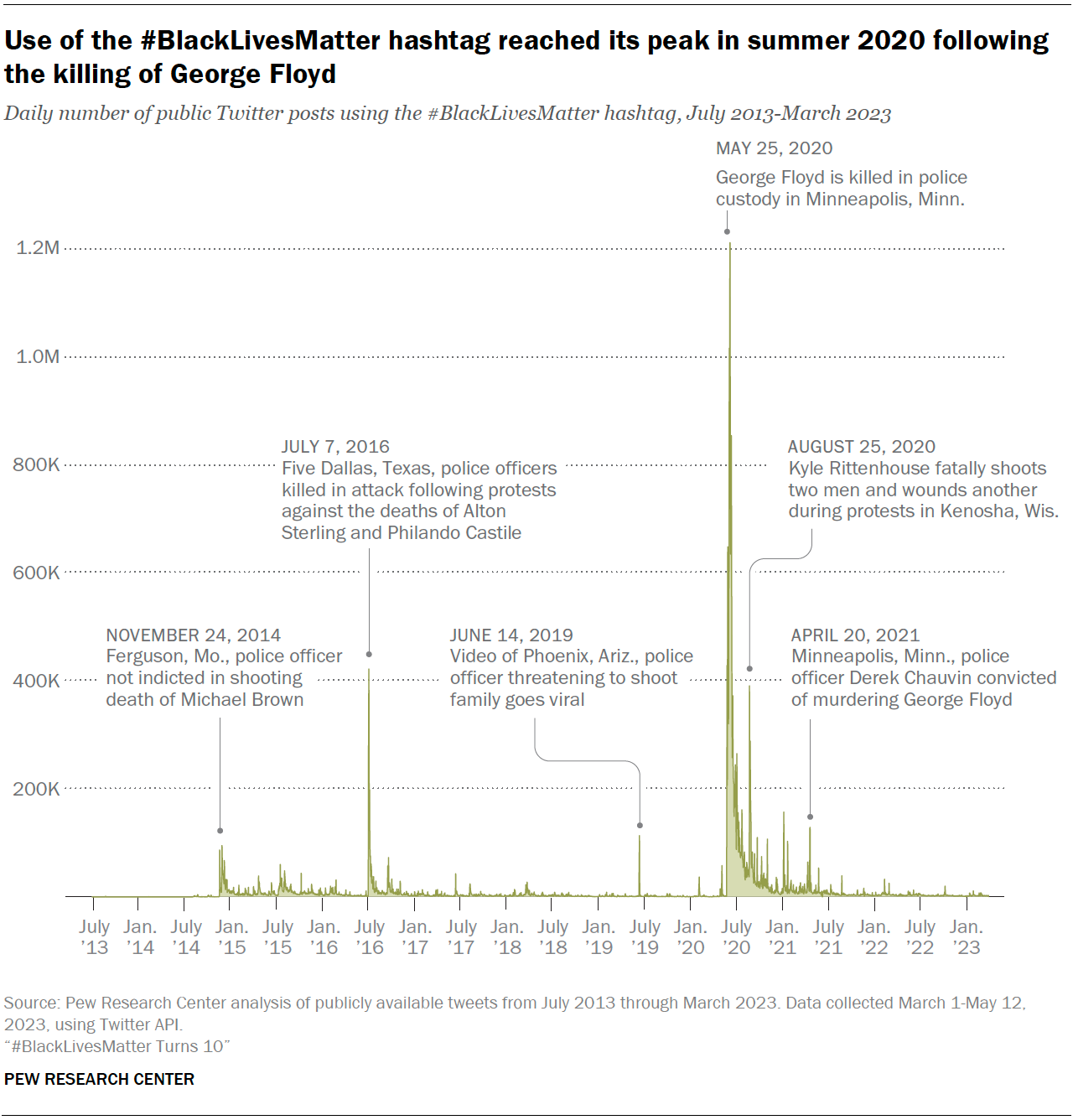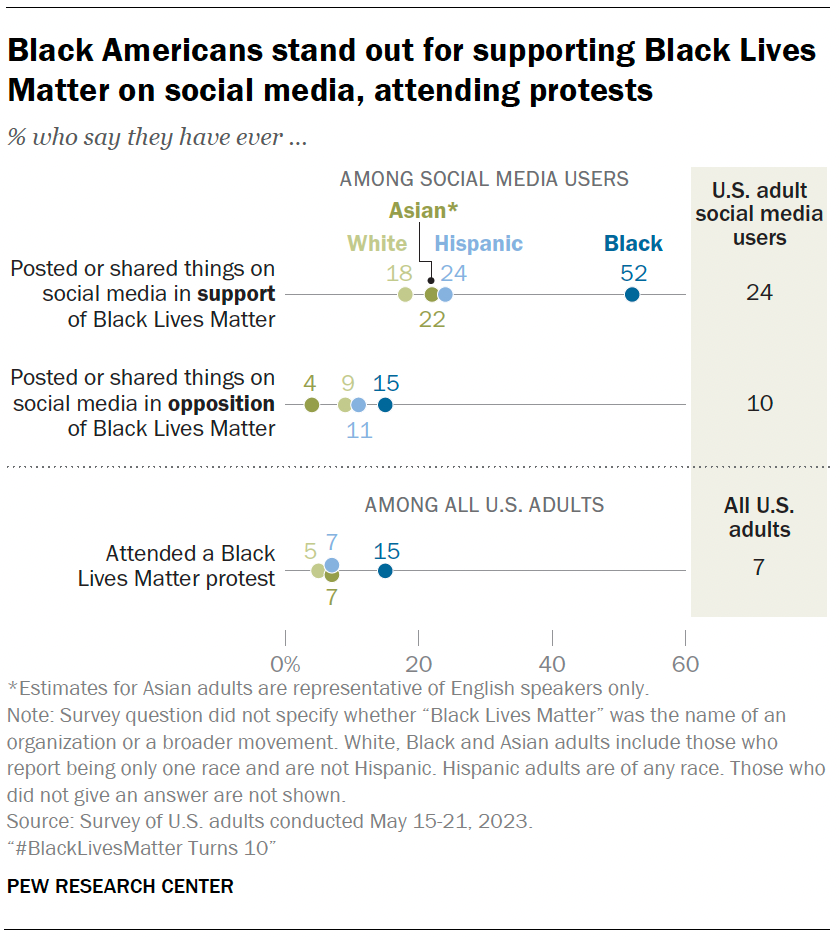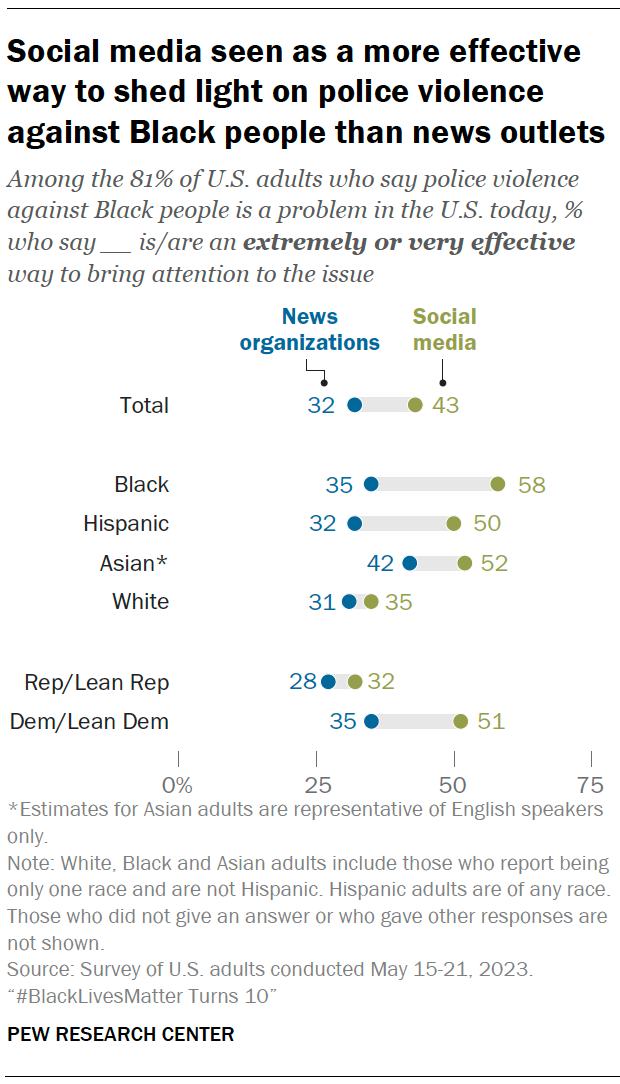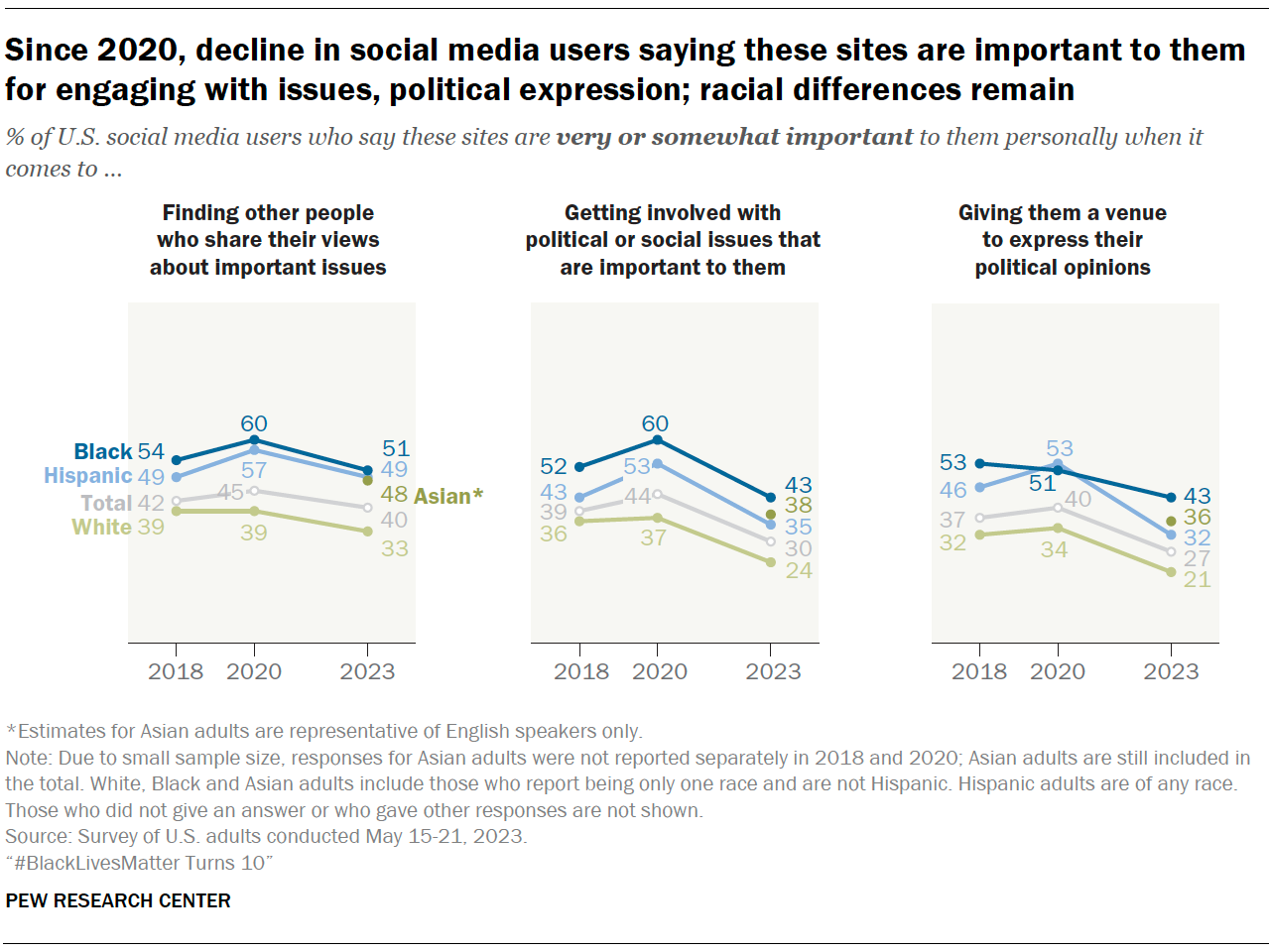Social media, online activism and 10 years of #BlackLivesMatter

This report studies the evolution of the #BlackLivesMatter hashtag on Twitter and explores how the American public engages with political and social issues on social media. It uses a mixed-methods approach, including a survey of U.S. adults and an analysis of publicly available tweets.
The Twitter findings are based on an analysis of over 44 million publicly available tweets containing the #BlackLivesMatter hashtag from the last 10 years. Researchers from the Center used the Twitter API to collect tweets with this hashtag that were publicly available on the site as of spring 2023. Using this dataset, we analyzed how often Twitter users post and retweet the hashtag; whether these tweets express support or opposition to the Black Lives Matter movement; whether they mention policing or police violence; and the other hashtags that are mentioned alongside #BlackLivesMatter. For more details on how these tweets were identified and sampled, read the methodology.
The survey findings in this report are based on a survey conducted May 15-21, 2023, among 5,101 U.S. adults. Everyone who took part in the survey is a member of the Center’s American Trends Panel (ATP), an online survey panel that is recruited through national, random sampling of residential addresses. This way, nearly all U.S. adults have a chance of selection. The survey is weighted to be representative of the U.S. adult population by gender, race, ethnicity, partisan affiliation, education and other categories. Read more about the ATP’s methodology. Here are the survey questions used for this report, along with responses, and its methodology.
In July 2013, activists first used the #BlackLivesMatter hashtag to spark conversation about racism, violence and the criminal justice system following George Zimmerman’s acquittal in the shooting death of Trayvon Martin in Sanford, Florida.
Ten years later, Black Lives Matter stands as a model of a new generation of social movements intrinsically linked to social media. The enduring power of the hashtag itself is clear: More than 44 million #BlackLivesMatter tweets from nearly 10 million distinct users currently exist on Twitter today, according to a Pew Research Center analysis of publicly available tweets from July 2013 through March 2023.1
Use of the hashtag has fluctuated over the years, often in response to instances of police violence against Black Americans. And perhaps no event is more directly tied to the use of the hashtag than the murder of George Floyd by Minneapolis police officer Derek Chauvin on May 25, 2020.

Over half of all existing tweets that include the #BlackLivesMatter hashtag were posted from May to September 2020. And of the nearly 10 million distinct users who have tweeted the #BlackLivesMatter hashtag, 6.8 million of them – most of whom had never used the hashtag previously – posted it during that five-month period.
Jump to:
Summer 2020 marked a high point in the number of tweets mentioning #BlackLivesMatter. But the hashtag remains an ongoing presence on Twitter to this day. Since October 2020, it has been used in nearly a quarter-million tweets per month.
Here are some of the key findings of this analysis of a decade of #BlackLivesMatter on Twitter:
- Most #BlackLivesMatter tweets express support for the Black Lives Matter movement. Some 72% of all #BlackLivesMatter tweets have expressed clear support for the movement or its broader objectives. Just 11% have expressed opposition, with the remainder not expressing clear opposition or support.
- Policing and police violence have been a consistent topic of focus in these tweets. One-third of all #BlackLivesMatter tweets over the last decade have mentioned police, victims of police violence or violent confrontations between civilians and law enforcement. Despite the many changes in the political and social landscape that have occurred during that time, policing has been a consistent focus of the #BlackLivesMatter conversation since 2013.
- Over the years, #BlackLivesMatter has been associated with a diverse set of other hashtags and causes. Some 55% of all #BlackLivesMatter tweets also include other hashtags. In the movement’s early years, the most common of these other hashtags referred primarily to specific instances or victims of police violence against Black Americans. More recently, they have expanded to include a variety of issues and causes.
- Much of the #BlackLivesMatter historical record is no longer available. Black Lives Matter is one of the most prominent social movements to develop and evolve entirely within the social media era. But our analysis indicates that around one-third of all #BlackLivesMatter tweets that were known to be posted from 2013 to 2021 – and as much as 40% of those posted during the summer of 2020 – are no longer accessible on Twitter.
Survey results: Black Lives Matter and social media activism
Along with this analysis of tweets, the Center also fielded a survey of 5,101 U.S. adults from May 15 to 21, 2023. It asked about Americans’ political activity on social media, and their views on social media’s role in national conversations about race and racial inequality.
The survey finds that exposure to Black Lives Matter on social media is widespread. Fully 77% of social media users say they have come across content related to Black Lives Matter on these sites. And this is true for majorities of users across most demographic groups.

Americans are much more likely to see posts related to Black Lives Matter than they are to personally post or share their views on the subject. And when they do choose to post, they are more likely show their support:
- 24% of social media users say they have ever posted or shared things in support of Black Lives Matter;
- 10% of users say they have done so in opposition.
Black social media users stand out for showing their support: 52% say they have posted or shared things in support of Black Lives Matter on social media. That share drops to about one-in-five each among Hispanic, Asian and White users.
The survey also finds that 7% of Americans overall say they have ever attended a Black Lives Matter protest. And that share rises to 15% among those who are Black.
Younger Black people are especially likely to be vocal supporters of Black Lives Matter on social media. Some 61% of Black social media users ages 18 to 49 say they have posted or shared things in support of Black Lives Matter. This group also stands out for attending Black Lives Matter protests, with 17% of Black Americans in this age range saying they have been to one.
Views of social media and the press as tools for bringing attention to police violence against Black people
Three years since nationwide protests and debates following the murder of George Floyd, an 81% majority of Americans believe police violence against Black people in the U.S. is a problem. But while 85% of Black adults describe it as a major problem, that share falls to 56% among Hispanic adults and 50% among Asian adults.2 An even smaller share of White adults feel this way (36%).

But how effective are social media or news organizations for bringing awareness to this issue? Among those who agree that police violence against Black people is a problem in the U.S., social media holds a modest edge:
- 43% say social media is an extremely or very effective way of bringing attention to this issue;
- 32% say news organizations are extremely or very effective.
The degree to which people view social media as an effective tool for spreading awareness varies by race and ethnicity, as well as by political attitudes.
About half or more Black, Asian and Hispanic adults describe social media as an extremely or very effective way to bring attention to police violence against Black adults, compared with a much smaller share of White adults (35%) who say this.
And Democrats and Democratic leaners who view police violence as a problem are more likely than their Republican counterparts to say social media is an extremely or very effective way to shed light on police violence against Black people (51% vs. 32%).
By comparison, views of news organizations’ ability to bring attention to these issues do not vary as greatly by race or ethnicity or by political party.
At the same time, the survey shows the public has complex views of the impact of social media on political engagement more broadly. Many Americans acknowledge how social media can be helpful in raising awareness, saying the following statements describe social media very or somewhat well:
- 67% say “social media highlights important issues that might not get a lot of attention otherwise”;
- 67% say “social media helps give a voice to underrepresented groups”;
- 47% say “social media make it easier to hold powerful people accountable.”
But larger shares believe these platforms can be a distraction and are ineffective:
- 82% say “social media distracts people from issues that are truly important”;
- 76% say “social media makes people think they’re making a difference when they really aren’t.”
Value users place on social media for finding like-minded people, sharing political views
Overall, four-in-ten social media users say these platforms are very or somewhat important to them personally when it comes to finding others who share their views about important issues. Smaller shares place high importance on using social media to get involved with political or social issues (30%) or express their political opinions (27%).
But the level of importance users place on these sites for their own political engagement has declined over time.
The share of social media users who describe these sites as very or somewhat important to them for getting involved with issues they care about dropped from 44% in 2020 to 30% today. This decline is also present in views about social media being personally important for expressing their political views or finding like-minded people.3

As was true in previous Center surveys about social media activism, the value users place on social media for their own political engagement varies by race and ethnicity.4 About half each among Black, Hispanic and Asian social media users say these sites are important to them for finding others who share their views about important issues, compared with one-third of White users. A similar pattern is present when asked about getting involved with issues or expressing their political beliefs on social media.
Other key survey findings:
This survey also asked about five specific activities people may have recently participated in on social media, and it finds that some activities are more common than others. Among U.S. social media users, in the past year:
- 34% say they have taken part in a group that shares an interest in an issue or cause;
- 26% have encouraged others to take action on issues that are important to them;
- 14% have looked for information about rallies or protests happening in their area;
- 14% have changed their profile picture to show their support for a cause or issues;
- 12% have used hashtags related to a political or social issue.
In total, 46% of social media users have done at least one of these activities. Certain groups – particularly those who are Black – are more likely to report recently using social media for these purposes.


